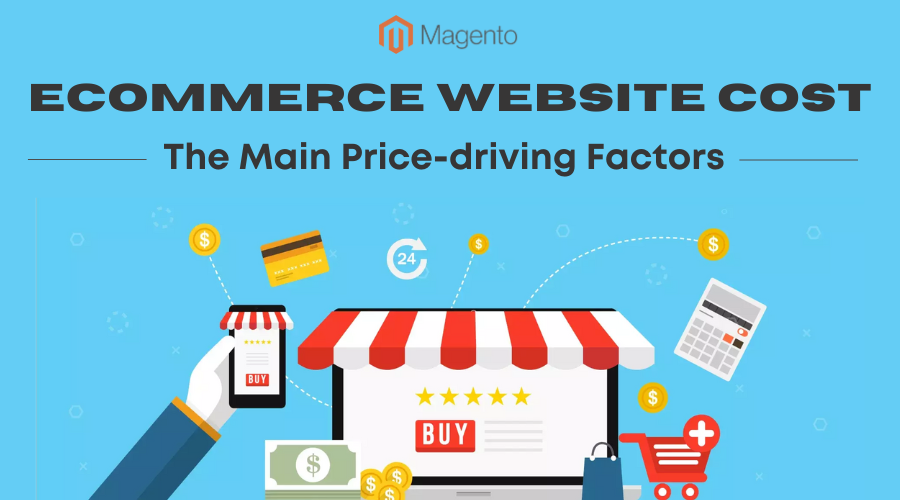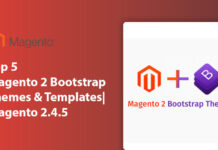
What is the cost of an eCommerce website? This question bothers most retailers since a solid online presence is essential to stay competitive in the modern market. So, here’s an answer: the price of creating an eCommerce website can range from $40,000 to $250,000.
The final number depends on various factors, so in this article, we’ll examine them in detail and discuss the features and technologies of eCommerce sites and their impact on cost.
Table of Contents
I. What factors affect eCommerce website cost?
Let’s begin with exploring the major factors that impact the prices of eCommerce websites. These include:
1.1. Number and complexity of features
The more features you want to include in your eCommerce website and the more complex they are, the higher the final price will be. For example, if you plan to build a Minimum Viable Product (MVP), it will cost around $10,000 – $50,000. However, the more additional features and integrations you want to implement, the higher the price.
1.2. UI/UX design
The cost of an eCommerce website design primarily depends on complexity and ranges from $5,000 to $35,000+. For example, a simple, minimalistic design with few elements will be much cheaper than a complex project with many intricate visual details.
1.3. Number of third-party integrations
As a rule, the cost of an ecommerce website includes integrating third-party services and tools. You may need AI chatbots and payment gateways (e.g., Stripe, Paypal, etc.). You can also use third-party cloud storage such as Amazon Web Services. The more third-party services you want to integrate, the more development time will take, affecting eCommerce website pricing.
1.4. Development team location
The region where you choose to work with an IT vendor to build an eCommerce website will significantly affect the cost. For example, Central and Eastern Europe and Asia have the lowest hourly rates. At the same time, the cost of eCommerce website development in the USA or Australia will be much higher.

1.5. Cooperation model
Choosing a cooperation model for your eCommerce website development is also important. If you plan to assemble an in-house team, you must include additional costs for rent, equipment, social benefits, etc. If you go for outsourcing, on the other hand, you will be able to reduce the cost significantly by avoiding administrative wastage.
II. Average eCommerce website cost by type
So, we have looked at the main factors affecting ecommerce website development costs. Now let’s structure this information and find out how much an ecommerce website costs depending on its type:

2.1. Simple ecommerce website
This ecommerce platform is usually a website for a single brand that is relatively easy to develop. It includes a minimum of features and complex design elements. The cost of such a website is approximately $40,000 – $100,000+.
2.2. Medium eCommerce website
This eCommerce website usually represents several significant brands, so it takes longer to build and may require additional services such as online storage. The average median eCommerce website price is $100,000 – $200,000+.
2.3. Sophisticated eCommerce website
Such eCommerce websites mostly mean large-scale marketplaces offering many products from different vendors. They require more time and effort to build and additional storage and advanced features. An eCommerce website of this type can cost $200,000 – $300,000+.
III. Custom eCommerce website vs. Ready-made: How to choose the most cost-effective option?
When developing an eCommerce website, you can consider two options:
- Creating a custom site from scratch
- Using an off-the-shelf platform
Each option has its advantages and disadvantages, including cost.
Custom ecommerce websites are built entirely to your needs, including unique branding. Thus, everything from design and functionality to usability will be customized to your needs. However, custom ecommerce website development costs can be pretty high, as a team of developers will build everything from scratch.
Alternatively, there are ready-made ecommerce platforms such as Shopify or WooCommerce. Best website builders for eCommerce offer templates that you can utilize to build your online store quickly. These platforms are often more affordable than custom-built sites and require less development time and resources. However, there is no way you will stand out from your competitors using this method. In addition, the functionality of ready-made platforms may not be enough for your company’s needs and can not provide the required scalability in the long term.
IV. eCommerce website cost: Why investments worth it?
eCommerce website development costs can be high, yet businesses still invest money. Why? There are several main reasons:
1. Sounder audience reach. eCommerce website development helps companies largely boost sales by allowing them to reach clients not only from their neighborhoods but also worldwide.
2. Raised sales and revenue. By developing an online store, retailers can sell goods anytime, increasing sales and revenue.
3. Informed decision-making. eCommerce websites provide precise analytics, including customer behavior and preferences data, and businesses can use it to improve goods supply and increase revenues.
4. Higher competitiveness. Today, when 70% of all shopping in America is online, it is critical to have an online sales platform to stay concurrent on the market.
V. Ecommerce website price: Tech stack components to consider
One of the important components that make up the cost of the ecommerce website is the technology stack, which includes programming languages, frameworks, and tools for building a website. Here are the leading technologies:
1. Front-end development. This includes HTML, CSS, and JavaScript to create the website’s user interface and design. The more complex your website is, the more technologies must be involved, increasing the overall eCommerce website design cost.
2. Back-end development. Back-end development involves using server-side languages like PHP, Python, or Ruby on Rails to manage server-side logic and databases.
3. Database Management. A robust database management system is needed to store product information, customer data, etc. Popular databases such as MySQL or MongoDB may require additional costs depending on your needs.
4. Payment Gateway Integration. Integration with payment gateways (e.g., PayPal, Stripe, or Square) is critical to processing online transactions securely. Each gateway has different fees and integration requirements, which you must budget for.
5. Security features. Security measures such as SSL certificates, HTTPS encryption protocols, and secure authentication methods are necessary to prevent cyberattacks. Investing in top-notch security features may increase development costs, but they are necessary to build customer trust.

VI. How much does it cost to create an eCommerce website: Price by features
Now, let’s examine some of the basic features of an eCommerce website and the approximate cost of developing them.
Product catalog: $500 – $2,000
This is one of the main sections of an eCommerce website that showcases all the products available on your site. Each product also needs its page with detailed descriptions, images, and prices.
Shopping cart and checkout: $1,000 – $3,000
The shopping cart is the transitional step between selecting and buying. It holds the items selected by customers. From there, the buyer checks, specifying the necessary information, such as the shipping address and payment method.
Online payment system: $500 – $2,000
Integration with payment systems allows customers to pay for goods directly on your website using credit cards, e-wallets, or other convenient methods.
Order status tracking: $500 – $1,500
This feature allows buyers to track their order status and determine when an order has been processed, shipped, and delivered. This increases customer satisfaction and provides transparency in the delivery process.
Thus, the approximate cost of implementing basic features is $3,500 – $6,500. Note that this calculation does not consider all other factors influencing the cost to build a website.
Final thoughts
eCommerce website costs are made up of many factors, each affecting the final price in one way or another. You can create a rough estimate by analyzing your requirements and making a clear plan for your project; however, when you need a detailed estimate of the cost of eCommerce website development, it is worth contacting a professional software provider who will help you calculate the price and build a customized solution for you to increase the number of sales.
Author bio
 | Yuliya Melnik is a technical writer at Cleveroad, a software development company in Ukraine. She is passionate about innovative technologies that make the world a better place and loves creating content that evokes vivid emotions. |












![[SALE OFF] Discount 30% All Premium Extensions On Christmas And New Year 2025 christmas-and-new-year-2025](https://landofcoder.b-cdn.net/wp-content/uploads/2024/12/christmas-and-new-year-2025-1-218x150.png)






